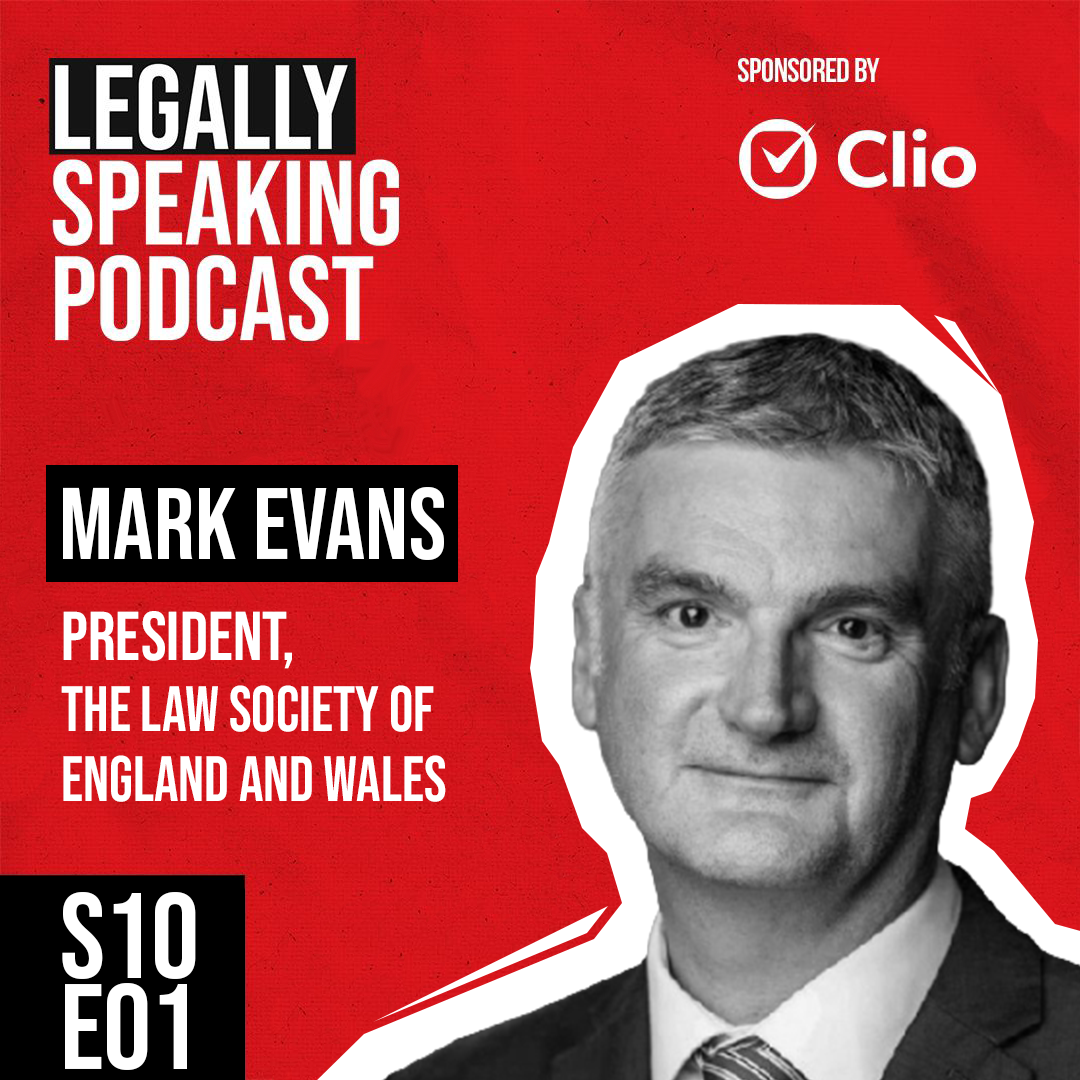
Mark Evans of The Law Society of England and Wales on Justice, Legaltech & Wellbeing – S10E01
On today’s Legally Speaking Podcast, I’m delighted to be joined by Mark Evans. Mark is the
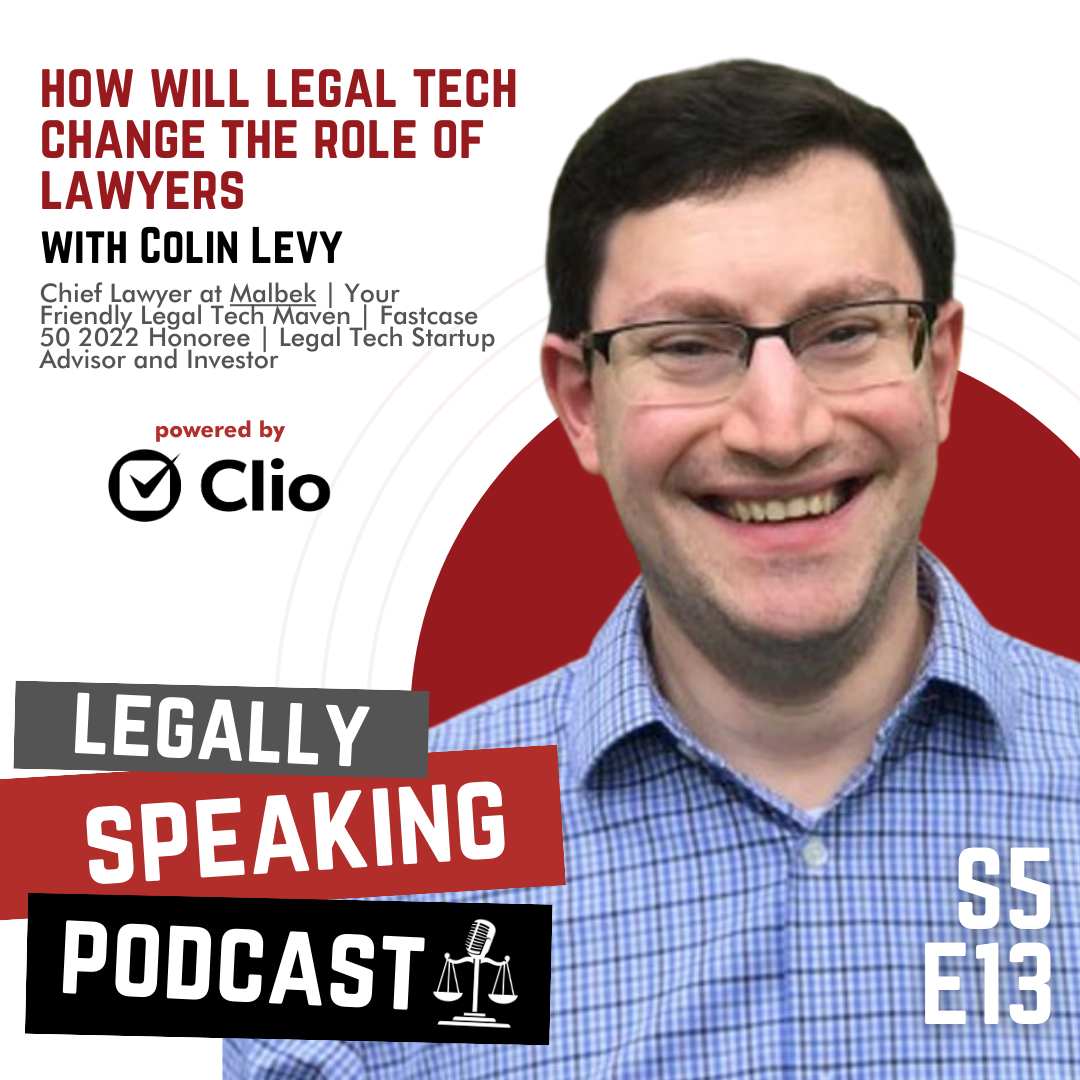
This week on the Legally Speaking Podcast, our host Robert Hanna welcomes Colin Levy.
Colin is a legal tech consultant and director of Legal and Evangelist at Malbek, where he carries out his mission of bridging the tech world with the legal world.
Alonside his work at Malbek, Colin is an Advisory Board Member for Proxy, a cloud-based legal workflow tool. He also has a blog, titled ‘Notes from the Front Lines of Legal Innovation’ which was named by Feedspot as one of the Top 30 legal blogs in 2020.
In this episode, we discuss the following:
Connect with Colin via LinkedIn
00:01 Robert Hanna:
Welcome to the Legally Speaking Podcast. I’m your host Rob Hanna. This week, I’m delighted to be joined by Colin Levy. Colin is a legal tech consultant and Director of Legal and Evangelist at Malbec, where he carries out his mission of bridging the tech world with the legal world. Alongside his work at Malbec. Colin is also an advisory board member for Proxy, a cloud based legal flight workflow tool. He also has a blog titled Notes from the Frontlines of Legal Innovation, which was named by Feedspot as one of the top 30 legal blogs in 2020. So a very, very warm welcome, Colin,
00:40 Colin Levy:
Thank you very much for having me.
00:42 Robert Hanna:
Absolute pleasure. Super excited about this one. So before we dive into all your amazing achievements, projects, and what you’ve been doing to educate the global legal community over the past few. So, we do have our customary icebreaker question here on the legally speaking podcast, which is on a scale of one to 10, 10 being very real, what would you rate the hit TV series suits in terms of its reality?
01:11 Colin Levy:
Well, I haven’t exactly seen a whole lot of episodes of suits. So this is a bit of a difficult question for me to answer. But I would say that, generally speaking, most TV shows that represent lawyers or the legal profession are not all that realistic. So I would say probably between three and four,
01:29 Robert Hanna:
Yeah, three or four. And I think based on that, and given what you said, we will move swiftly on. So let’s start at the beginning, as we always like to with all of our guests. Tell us a bit about your family background and upbringing.
01:43 Colin Levy:
Sure, so I, you know, grew up in the northeast of the US I have a twin brother, who is not a lawyer, and doesn’t look anything like me. We’re fraternal twins. So basically, we look like brothers, I would say, but not twins. I also happen to have a little more hair than he does. Are you the oldest one? But no, he is by five minutes.
02:09 Robert Hanna:
Does that count for a lot in your relationship?
02:12 Collin Levy:
Not really. But, uh, but in terms of the lawyer, sort of piece of me. So my mom was a lawyer. My mom’s dad was a lawyer. Her uncle is a lawyer. So a lot of lawyers on that side of the family that played perhaps a little bit of a role in terms of my decision to become a lawyer pursue being a lawyer. But really, what drew me to the law was the fact that the legal profession and legal industry incorporates a lot of different areas. And so when you’re a lawyer, you kind of have touch upon a lot of different areas that you are always learning about. And certainly in house lawyer that has definitely been a large part of my experience has been learning about all these other areas of business, that all have legal implications. And so my job as a lawyer has been to essentially learn as I went along about all these different areas and see how I could best serve the clients that I was working for.
03:16 Robert Hanna:
Yeah, no, and I love that. And I didn’t realize that was such a, a generational legal family. So thank you so much for sharing that and obviously, touch on why, and maybe how you broke into the law, but at what point did legal tech become your focus?
03:32 Colin Levy:
So I first sort of got exposed to legal tech, when I worked for a big law firm in New York, prior law school as a paralegal, and what my job there was creating electronic discovery or e-discovery databases and managing them, maintaining them creating them. And that was my first exposure to technology and the law. However, what struck me as a bit odd was that the lawyers really didn’t know about the tech at all in terms of how it worked, or whatever. All they knew was that they had this place where they went to, to go look at different documents and look at different pieces of evidence, and someone else to kind of all put it together for them. So that exposure, sort of piqued my interest. And then when I got to law school, there was very little talk of technology at all, which was disappointing, but not entirely surprising after my experience in New York. And so I really after I graduate from law school and started looking for a job and working, I thought to myself, surely I can’t be the only person who is trying to learn more about technology, and how could perhaps impact the legal profession and legal industry. So I just took it upon myself to reach out to people in the space who were either teaching about technology to law students, or actually creating technology for lawyers or legal professionals. And that’s how I first started learning about legal tech.
04:53 Robert Hanna:
Ah, lovely. Thank you so much for that sort of comprehensive overview and you touched on it a bit before but I want to also ask a bit more about your time as an in house lawyer, you know, what was unique about that experience? And how does it differ to being a lawyer at a law firm.
05:11 Colin Levy:
So my experience in house, I have never worked for a law firm, I can’t necessarily compare entirely. But I would say that in House lawyers, generally speaking, are closer to the business because they’re a part of the business. Yeah. And they also, quite frankly, are asked to do I think more in terms of coverage in terms of responses and responsibilities. And in terms of their ability to move things a lot quicker and faster. Because you know, business is not waiting for you to kind of keep up with it, it’s going to keep moving. So your job is to stay on top of things and be proactive, and always be learning about how you can better be a business partner and a legal resource for the company that you work for. Whereas I think if you work for a firm, you have a lot of different clients. So every client certainly is important to you. But you’re not as close to each client as you would be if you were working in house. Because when you work in house, you obviously have just one client, which is that business, and all the different functions that make up that business.
06:11 Robert Hanna:
Yeah, no, I think you think that’s a really good differential. And we speak to a lot of particular lawyers that are going through their journey, saying, you know, that is one of the major benefits of being in house, they feel part of the organization, and they really get close into the business. So thank you so much for highlighting that. And so where we are the present day, and you know, you’ve taken on a new exciting role with Malbec, could you tell us a bit more about Malbec and what they do?
06:36 Colin Levy:
Sure. So Malbec is a Contract Lifecycle Management Company, we have a really sleek, advanced, intuitive, I would argue platform that allows legal departments to better manage the entire lifecycle of their contracts, anywhere, you know, everything from, you know, putting the contract together to managing the negotiation process, to implementation, to post execution and all that. And so it’s a really great platform, I frankly, you know, I’ve used a variety of different platforms over the course of my in his career, and this one, is, by far the easiest for me to use the easiest to get up to speed on and allows me to get everything I need to get done very quickly, and takes all a lot of the pain, if not all, if not well, if not all of the pain, I would say out of managing contracts. And so it’s really a great, great service and product. And the company itself, the I can’t speak highly enough of the people are fantastic. They are very experienced in the space. They know what they’re doing. They really care about their product, they also really care about the people that are their customers, and also care about the people that work for the company. And it’s just been an awesome experience. And I’m really honored and humbled to be a part of the company.
07:50 Robert Hanna:
Yeah, no. And thank you so much. And that segues nicely on to my next question. You touched on it there. Because you’ve said on LinkedIn, which you know, we all know you’re phenomenal on that platform. And that Malbec has a great culture. And this is another buzzword that gets thrown a lot around these days. What does it mean in practice for a place of work to have a good culture? And is that important for say, prospective lawyers choosing where to apply?
08:18 Colin Levy:
So I would say that I would, you know, culture is a broad topic, but I would define it as essentially being, you know, what sort of?????????????? is the general vibe of a company, what kind of are the values that that company and people embody, and multipack has that rape culture. And what I would define as being a great culture as being would be one where the leaders lead with empathy and lead with listening and understanding. And where there is a inherent recognition of the humanity of everyone that’s working for the company, that we all have lots, we’re all imperfect, because we’re humans. So we’re not expected to be perfect, we’re just expected to do our best, which I think is all that anyone could possibly ask of anyone else. And on top of that, there’s really this sort of team camaraderie and sort of this understanding sort of that is not really stated explicitly, but it’s just there that we’re all in this together, and all trying to do our best and move things along and really want to be there for one another, both on a professional as well as on a personal level. And that, to me really, can make for a great culture. And with respect to your second question about lawyers looking for a company to work for, you know, I really think that culture should be a key differentiator for you when you’re looking at different places to work. And you really want to get to understand kind of the people how they work. You know, what do they value in those that they work for? How do they manage people and sort of what are the expectations of employees? And those are some of the questions that I frequently have asked when I’ve been interviewing for a job because culture is one of those things that’s sometimes difficult to sort of draw out during the interview process, but it’s nevertheless incredibly vital to dry to do so. Because you obviously want to like where do you work and want to enjoy the work that you’re doing and want to do it for the people that you work for. And that only happens if there’s a good culture in place, which is unfortunately, not always the case.
10:16 Robert Hanna:
Yeah, no, so true. And thank you for highlighting that and giving some good practical suggestions and an overview. So on to legal tech, which you know, you very much are one of the most prominent, I believe global thought leaders in this space right now. But again, legal tech is perhaps a buzzword that a lot of people talk about. But what exactly is that concept? And to that end, what are we talking about when we say legal tech, as opposed to for instance, let’s say legal design?
10:45 Colin Levy:
Sure. So legal Tech, I agree is something that can be somewhat amorphous to think about, in the minds of most people. The way I would define it is basically two things. Number one, it’s made up of technologies that are used, and or developed by legal professionals to do legal work. Because it’s not just designed by lawyers for lawyers that could be designed by someone who isn’t a lawyer, but for a legal professional who may or may not be a lawyer themselves. So it’s sort of that set of technologies, which include, I would argue, tools that we already use every day, like Word, Excel, Google, things like that, but also more advanced tools, like the ones that are similar, the one that Baalbek sells, and creates. And I will also say that legal Tech is a movement in a community of people seeking to sort of make the legal professional legal industry, one that is more dynamic, more tech based, more data driven, and one that’s better suited for the needs of a dynamic, tech based world like the one we live in today. And in terms of distinguish it from legal design, we go design certainly is, I think, can be a part of the attack in terms of how you think about designing a product, and think about the interface and kind of how it looks. But I also think it’s a very respected and very important community of people in its own right. And it’s no movement. And so it is, while it has influences on legal tech, it by itself is its own thing. And rightfully so.
12:17 Robert Hanna:
Yeah, no, thank you once again, for sort of giving that differential and, and also just further insight into the world of legal tech, because moving into, you know, the years ahead of us, it’s going to be more and more of a thing. So with that, then is there a particular development in legal tech that you’re most excited about? Or you’ve been tracking or your foresee happening now and in the future?
12:42 Colin Levy:
So I think I would answer that question by saying two things. One, certainly Contract Lifecycle Management, which has existed for quite for a while now and continues to generate a great deal of investment, I think, is only now starting to scratch the surface of what is actually potentially able to be done with contracts and deriving data and handle and analytics from contracts. So I think that that is a space to watch going forward, for sure. It also was one that I’ve lived in breed for most of my legal career. So I’m a little bit biased in that. And then I would say the other one is litigation, analytics and litigation prediction. I’m not a litigator. In fact, I want nothing to do with litigation or courtrooms at all. But I think the tools and data that has been created and being gathered on the litigation front is really exciting to see because we’re getting to the point now where you can make more strategic data driven decisions about how you choose and develop a litigation strategy, what you argue in court, and potentially even the probability of winning before a certain judge or an insert court. And I think that is very exciting to see. And just sort of, I think, points to the potential of data and analytics in the legal space, and held for so long the legal profession, I think, has been doing itself and more importantly, its clients a disservice by not making better use of data.
14:03 Robert Hanna:
Yeah, I love that you highlight that you know, they say data is the new gold. And I think it’s very, very true. So yeah, thanks. Once again. And you’ve mentioned online before, there are a lot of the legal tech tools you’ve used as an in house lawyer fell short of the mark, frankly. So how have they fallen short, and how could they improve?
14:26 Colin Levy:
So I would say that there are a couple areas that where they’ve fallen short one is in terms of just intuitiveness sort of ease of use. How hard is it to get going using a tool because the thing with most legal tools is, they’re not just going to work right off the bat, you kind of have to either train them or give them something to work with. So you know, that step, I think it’s really important for companies to focus on and making sure that that is done right, because that’s really important and for variety of reasons, but perhaps one of the more important reasons is that if someone doesn’t like using a tool, they’re not going to use it. So even if you spent all this money on this tool and put it in place, and promoted and socializing, and all of that, if someone doesn’t like the tool, and it’s their job to use that tool or something else to do their job, they’re not going to use it. And then what you’re left with is what one could call shelf-ware, where you basically have an expensive product just sitting on the proverbial shelf not doing anything. So I really think that’s something that’s important to focus on. In addition, I think that you really want to make sure that you are listening to your customers in terms of any feedback, they provide you any kind of insights they provide you with, first how they work, you really want that to be a relationship that is lasting, long lasting, and not one that is just sort of one off in terms of, alright, well, we got them to buy our product. Now we’re just going to let them go and leave them alone. That is not really the way I think to build a community or build a good solid customer base for our products, you really want to establish strong relationships with your customers. And I think that’s something that a lot of companies could be doing better. And certainly, I think you also have a lot of companies that that do it quite well, mall best or at least one of them. Clio is another app, imagine.
16:09 Robert Hanna:
Yeah, no, absolutely to two wonderful organizations that I agree are doing great things in this space. And could you tell us more about the contract analysis platform that you lead the beta testing for?
16:23 Colin Levy:
Sure, absolutely. So that was very early in my career. And it was I kind of joined when it was really in its early days. And so is me in a small group of people who are essentially trying to see if the system that had already sort of sort of been developed, I forget what the intent of the system was to do, which was to analyze and help with the reviewing of contracts. And so we were doing this with a very large financial services client, who put a lot of faith in this product. And it was really fun to be a part of that testing process. And that gave me my first taste into sort of both the product design process as well as just the legal check process and legal tech creation process as well. It really was a lot of fun to be a part of that experience in such an early stage of an early stage startup, frankly.
17:17 Robert Hanna:
Yeah. And obviously a great foundation for where you are today in terms of you know, what you’re seeing a known for, within the legal community, definitely, with all things legal tech. So, you know, I guess probably the million dollar question that you get asked a lot of the time is how do you see legal tech, changing the role of a lawyer in the future? You know, are robots going to be flying around taking over and you know, what’s going to happen?
17:40 Colin Levy:
Well, first of all, no robots, taking over people’s jobs, at least not entirely, in the near to short, near to medium term, first year. But I do think that what will happen and what is happening is that more and more lawyers and legal professionals are realizing that data is important. And they need to be making better use of data to drive decision making, and not just any data, but also being able to determine the data that they need and how to ensure that it’s of the quality they need, it’s the right data points that they should have. And then basically what how to make and then how to make use of it in terms of going forward. And using that data to provide perhaps analysis or advice or other types of information to business clients about what the next steps are? Because that’s really ultimately what the client wants is not whether or not something is okay to do. But if, what the next step should be if it’s not okay, or what should we be doing instead, that will get us further along to where we want to be. And I think lawyers are realizing that data is going to be an important element of them being able to do that task and provide that service for people. And also, I would say that lawyers are realizing now that they, frankly, have a duty to be competent in the tools that they use to do their jobs, not just in the tools that they know, but in other tools that could possibly help them do their jobs better. And that I think is reflected in part by the duty that competence that exists in the US right now in over 30 states, where lawyers in those states are required to have a degree of tech competence, which means an awareness of existing technologies and the risks and benefits of using those technologies.
19:25 Robert Hanna:
Yeah, love it. Love it. Absolutely. All over this. Colin, I’m really enjoying this conversation. And so moving on, then what are the biggest challenges to growth of legal tech, do you see? And does the law itself need to adapt to the new tools lawyers will be using in the future?
19:47 Colin Levy:
So that’s two very big. I would say that, first of all, certainly, lawyers, I think are by their nature. risk averse, and generally speaking, are also not really so keen on changing. But humans, humans, as it as a general species are not really big on change, you know, we like to sort of be where we’re comfortable, work with what we know. That being said, I think it’s more important than ever to be adaptable and be open to change, because the world is changing. For example, this pandemic that’s been going on for two years, no one expected it to happen. But it all forced a great deal of change upon us all that has made some of us I would say uncomfortable, but we now are growing more and more accustomed to this sort of new reality that we’re living in. So that’s, I think, an example of why change is happening and why it’s important to be open to it. But I also think it’s important to not underestimate the fact that resistance to change is a huge impediment to adoption of legal tech. And we’ve seen time and time again, how it is, for example, most recently in the state of California, they’re talking about potentially creating a sandbox allowing for new ways of delivering legal services, then a couple lawyers who also happen to be state legislatures have come out and said, Yeah, we don’t think this is good for the public. Well, my issue with that, with that, that statement, it’s really kind of self-serving, you know, it’s, it’s basically this protectionism that is also an impediment to adoption of legal tech and innovation, because the legal industry overall has been one that is self-regulated. And that, in turn has been an impediment, I think, to moving forward and providing services for the people most in need of legal services. So certainly, there’s that, that I think needs to be considered in terms of where we’re going from here in terms of what the future brings in terms of tech. I would say that, you know, tech, certainly more and more is able to do some of the tasks that lawyers do day in day out, isn’t it? We’ll do everything, no. But if you’re doing tasks that can be better done by Tech, I would say it’s up to you to let the tech to that those pieces of your job, and you been in use stick with what you can do to bring more value to your role that tech can able to do just yet.
22:20 Robert Hanna:
Yeah, no, I love that. And I think, you know, definitely what we would encourage people to on the libertarian podcast is to go into the Embrace camp, I think, you know, now is the time to definitely, you know, start listening to podcasts like this, start reading around it, because it’s only going to get more and more, you know, common, you know, at the moment, it’s not quite there, but it’s going to be so I guess that leads nicely onto again, my next question in terms of how would you advise a prospective lawyer to prepare for using an understanding legal tech, you know, what skills do they actually need?
22:50 Colin Levy:
So that’s a great question. I think that a lot of young lawyers would do well, to understand how to work with others how to listen and learn from others how to collaborate, how to recognize the fact that you don’t know everything, and you’re not always going to know everything, and that’s okay, which is why you rely on other people and learn from them. I would say also, to understand that tech is not just robots are coding, and no, you don’t need to learn how to code to be able to be tech savvy. Tech should not be intimidating or fear inducing. Tech should be seen as yet just another tool in your toolbox, that you are able to turn to deliver legal services for those who rely on you to deliver services. So in that vein, I would say, look at kind of what you do as your job and understand what could possibly help you do that job better. Whether it’s a tech tool, or whether it’s learning something new, or whether it’s listening someone else and learning about how they work, and what they know. And letting those lessons seep in and educate you in terms of how you can work better.
23:54 Robert Hanna:
Yeah, no great advice. Great advice column. Thanks for that. And, you know, one of the other things we talk a lot about here on the Liga speaking podcast is you know, the importance of embracing social media and building a personal brand. And I think you’re someone who’s done a wonderful job of doing that. So you know, maybe explain some of our listeners, how you are utilizing the likes of social media to build a personal brand and perhaps creator, a community you’ve got, you have the sparks, I know it’s growing by the minute.
24:23 Colin Levy:
Well, thank you, it definitely is growing faster than I would have anticipated. Frankly, you know, I just have found social media to be a really powerful means of connecting with others, even if those others are in other countries, other states, you know, wherever they are in the world. And really, I think the way I found social media be beneficial in terms of making those connections is by just sharing a little bit about myself and sharing about what I’m thinking about what I’m struggling with. What makes me happy. What makes me sad, you know, I’m not afraid to share a little bit part Have a little part of myself with others. And I think that that sort of authenticity, as some may call it, I think helps forge connections with others. And so I really found social media platforms, particularly LinkedIn, but also twitter, to be effective in allowing me to share my thoughts and connecting with others on the basis of others, also having similar thoughts, or perhaps disagreeing with thoughts that I have and wanting to share their opinion. And that’s a great opportunity for me to learn and to grow. And likewise for them to learn and grow as well. And I really find that very beneficial, inspiring, and keeps me coming back to social media and using it to help others be inspired, help others learn, and help support others trying to make their way in this very complex, evolving and sometimes confusing world.
25:48 Robert Hanna:
Yeah, no. And I love that because you talk about a lot of the things that I really resonate with me, particularly around the storytelling aspect, the authenticity piece and being human and actually winning that human connection. And it just builds a much farther loyal community. So I absolutely love that. And I guess before we wrap up, Colin, I know you’re doing a number of things you don’t sit still. And you know, I believe you. There’s a newsletter that’s just recently come out. But you know, what else can we expect to see from you during the course of this year? What else is on the horizon? What have you got planned?
26:19 Colin Levy:
Well, there’s not much time left to this year. But I am making the most of it. As you did mention, I did launch a LinkedIn newsletter. First issue came out last week, I’ll probably be doing a policy issue this week or next week, and I plan to do monthly issues of it going forward. And really what it is, is just a way for me to further expand upon what I post about with respect to legal tech and legal innovation. In addition, I will be relaunching my website, which will include my blog, perhaps best known for its interviews of leaders in the legal tech space, early next year, which I’m excited about doing, as well as offering some exciting new services through the site, including some consulting services, as well as some content creation services as well. So I look forward to sharing more once we get closer to the relaunch date. And in addition, I am just continuing to do speaking and writing gigs from time to time with respect to helping, again grow the community of people interested in trying to make the legal industry one that is more suited for those most in need of legal services.
27:29 Robert Hanna:
Yeah, absolutely. And we wish you every success with that, and I guess you know, a lot of our listeners, and people tuning in and fans are gonna want to definitely get in touch. So if they if they want to learn more about legal tech and your journey or some of those initiatives, where are they best to reach you feel free to shout out particular web links or social media handles and we’ll also share them with this episode for you too.
27:52 Colin Levy:
Excellent. Well, of course you can go to my website columnists, Levine comm if you’re happens to be looking for a Contract Lifecycle Management Company, I have to give a shout out to my callback, I strongly encourage people to check it out. In addition, they can catch me on LinkedIn under my name, or Twitter at Clevy_law and I welcome connected with anyone who wants to get in touch.
28:17 Robert Hanna:
Well, thank you so much, Colin, it’s been an absolute pleasure having you on the show. You’ve definitely educated me as I know you would all of our listeners but wishing you lots of continued success with your career but from all of us on the Legally Speaking Podcast, over and out.
You may also tune in on Goodpods, Apple Podcasts, Spotify, or wherever you get your podcasts!
Give us a follow on X, Instagram, LinkedIn, TikTok and Youtube.
Finally, support us with BuyMeACoffee.
🎙 Don’t forget to join our Legally Speaking Club Community where we connect with like-minded people, share resources, and continue the conversation from this episode.
Sponsored by Clio – the #1 legal software for clients, cases, billing and more!
💻 www.legallyspeakingpodcast.com
📧 info@legallyspeakingpodcast.com
Disclaimer: All episodes are recorded at certain moments in time and reflect those moments only.

On today’s Legally Speaking Podcast, I’m delighted to be joined by Mark Evans. Mark is the
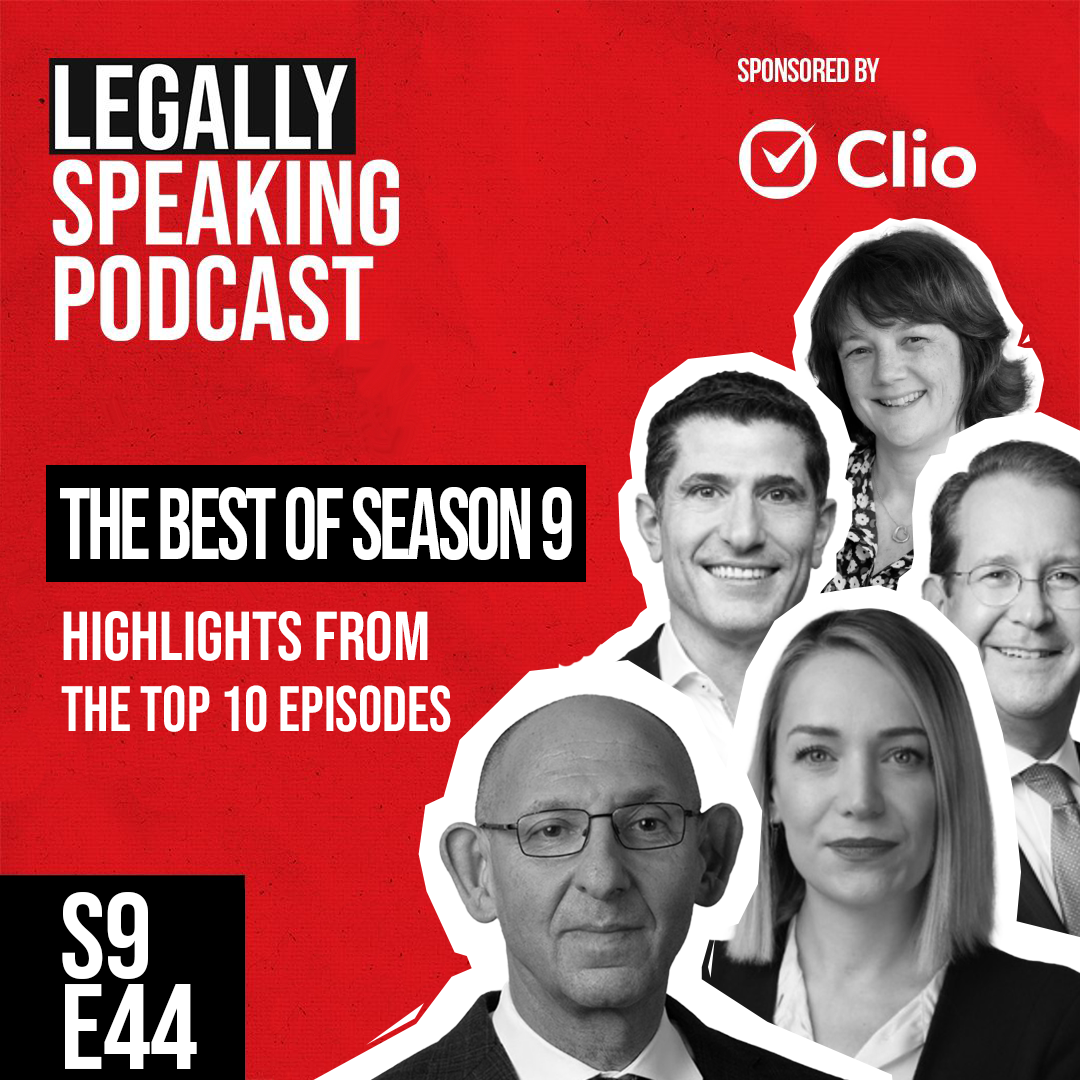
Welcome back and thank you for being part of the Legally Speaking podcast journey. We appreciate

On today’s Legally Speaking Podcast, I’m delighted to be joined by Brett Colvin. Brett is the
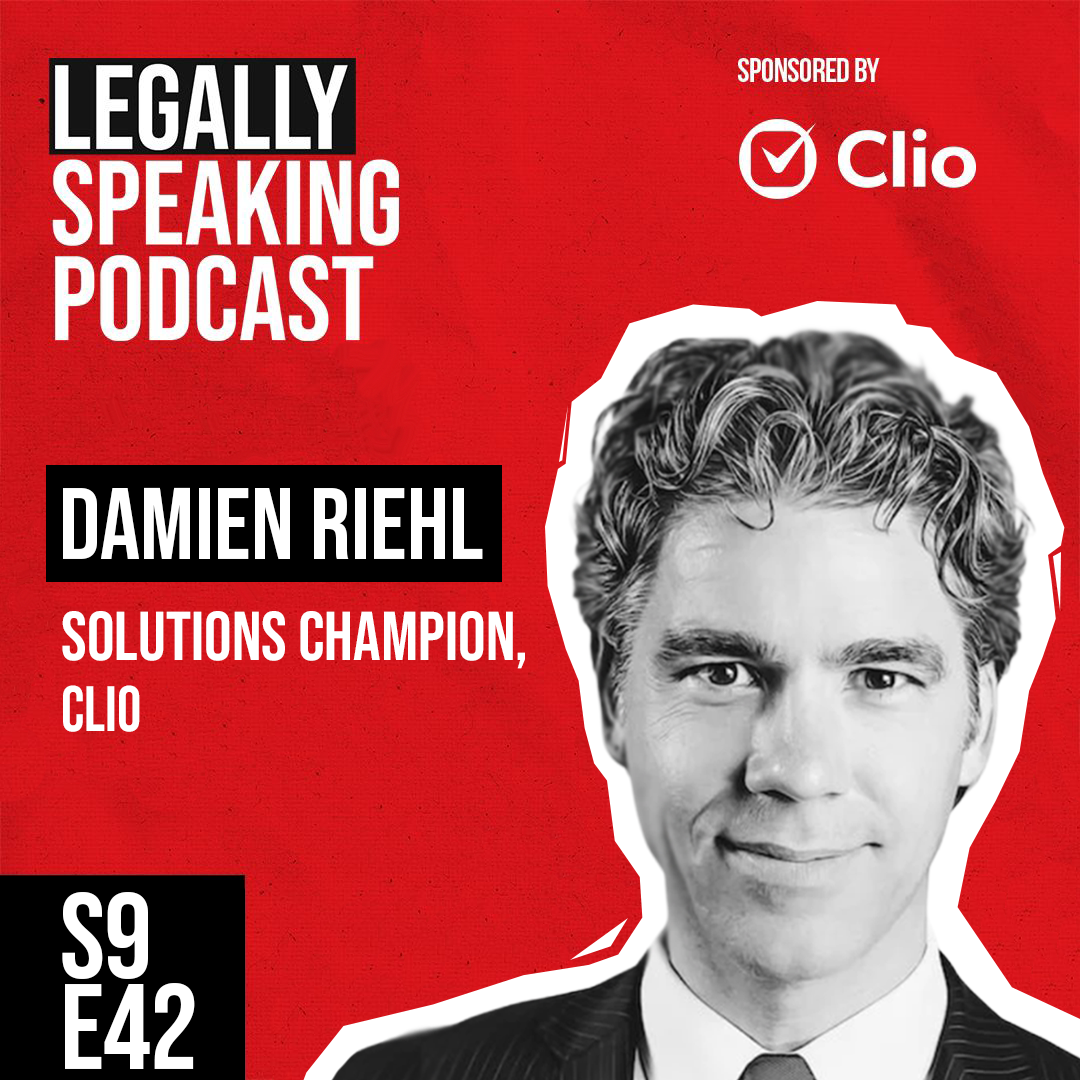
On today’s Legally Speaking Podcast, I’m delighted to be joined by Damien Riehl. Damien is a

Event Overview:In 2024, the Legally Speaking Podcast and HiveRisk founded a unique law firm leadership strategy
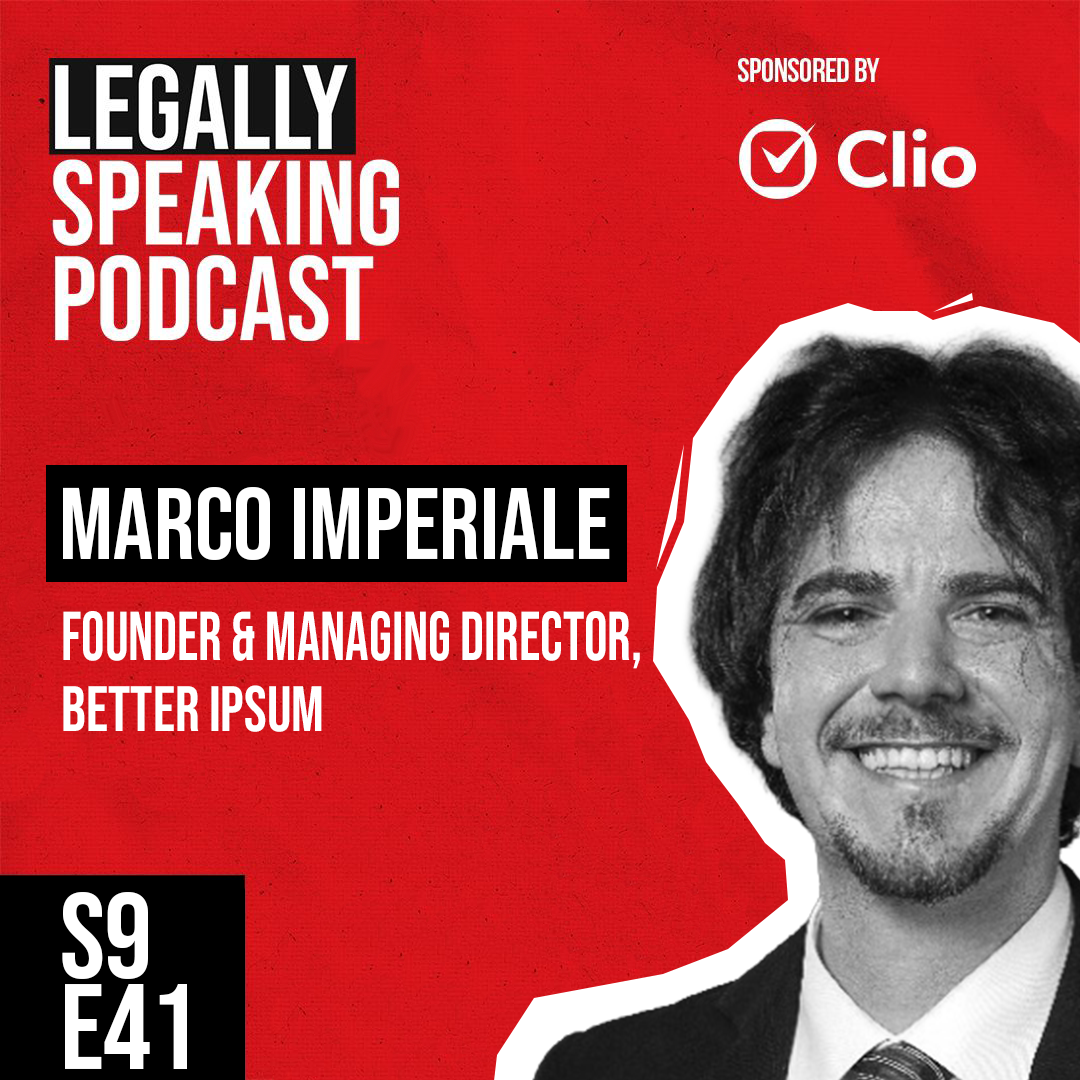
On today’s Legally Speaking Podcast, I’m delighted to be joined by Marco Imperiale. Marco is the

*DISCLAIMER* All episodes are recorded at certain moments in time and reflect those moments only. The podcast does not support or associate itself with any inappropriate behaviour or actions that may have occurred after recording.